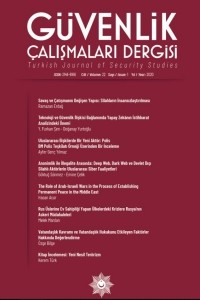Öz
Elinizdeki çalışma, polisin uluslararası ilişkilerde bir aktör olarak ortaya çıkışını, BM Polis Teşkilatı (UNPOL)’nı referans almak suretiyle incelemek niyetindedir. Bu doğrultuda, ilk olarak, Soğuk Savaş sonrası dönüşen güvenlik anlayışına odaklanmaktadır. Bu süreçte devletler arası savaş yerini devlet içi çatışmalara bırakmıştır. İkinci olarak, söz konusu devlet içi çatışmalarda kolluk ve asayişi anahtar görev kılan kamu düzenin gerçekleştirilmesi merkezi bir önem kazanmıştır. Tüm bu gelişmelerin bir sonucu olarak barış koruma operasyonlarının sayısı artmış ve bu operasyonlarda polis merkezi bir konuma yerleşmiştir. Polisin uluslararasılaşması, BM Polis Teşkilatı bünyesinde polis sayısında yaşanan artışı, misyonlarda görev yapan polislerin çoğalan ve çeşitlenen yetkilerini ve son olarak BM Polis Teşkilatı’nın örgütsel genişlemesini odağına almak suretiyle analiz edilecektir. Son olarak, çalışma, uluslararası polisliğin geleceğine dair sorunları ortaya koymaktadır.
Kaynakça
- Bellamy, Alex J; Williams, Paul ve Griffin, Stuart, (2010), Understanding Peacekeeping, Cambridge, UK: Polity Press.
- Bellamy, Alex J ve Williams, Paul D. (2012). Broadening the Base of United Nation Troop -and Police- Contributing Countries. Providing for Peacekeeping No. 1. International Peace Institute.
- Brodeur, Jean-Paul, (2005), “Force policière et Force Militaire. Frédéric Lemieux ve Benoit Dupont (Ed.) La Militarisation des Appareils Policiers, Canada: Les Presses de l’Université Laval, s, 41-58.
- Bayley, David H, (2001), Democratizing the Police Abroad: What to do and How to do it, Washington, DC: US Department of Justice
- Caparini, Marina L ve Osland, Kari M, (2016a), SGBV Capacity-Building in Peace Operations: Specialized Police Teams, NUPI Policy Brief, no. 35, Oslo: Norwegian Institute of International Affairs. NUPI
- Caparini, Marina L ve Osland, Kari M, (2016b), MINUSTAH’s Specialized Police Team to Combat Sexual Violence in Haiti, NUPI Working Paper, no. 867, Oslo: Norwegian Institute of International Affairs. NUPI.
- Darby, John ve MacGinty, Roger, (2003), Contemporary Peacemaking: Conflict, Violence and Peace Processes, Basingstoke: Palgrave.
- Day, Graham ve Freeman, Christopher, (2003), Policekeeping is the key: rebuilding the internal security architecture of postwar Iraq. International Affairs, C. 79, S. 2, s. 299-313. Dinnen, Sinclair ve Allen, Matthew, (2012), Paradoxes of postcolonial police-building: Solomon Islands. Policing & Society. C. 1, S. 21, 222-242.
- Donais, Timothy, (2011), “Reforming the Haitian National Police: From stabilization to consolidation’, Jorge Heine ve Andrew S. Thompson (Ed.) Fixing Haiti: MINUSTAH and Beyond, Tokyo and New York: UN University Press, s. 99– 100.
- Emsley, Clive, (2014), Policing the Empire/Policing the Metropole: Some Thought on Models and Types, Crime, History Societies, C. 18 S. 2, s. 5-25.
- Foradori, Paolo, (2018), Cops in Foreign Lands: Italy’s Role in International Policing. International Peacekeeping, C. 25,S. 4, 497-527. DOI: 10.1080/13533312.2018.1476854
- Greener, Bethan K, (2011), The Rise of Policing in Peace Operations, International Peacekeeping, C.18, S. 2, s. 183-195, DOI: 10.1080/13533312.2011.546096
- Hartz, Halvor A, (2000), “CivPol: The UN Instrument for Police Reform”, Tor Take Holme ve Espen Barth Eide (Ed.), Peacebuilding and Police Reform, London: Frank Cass, s. 27-42.
- Hills, Alice, (2001), The inherent limits of military forces in policing peace operations, International Peacekeeping, C. 8, S. 3, s.79-98, DOI: 10.1080/13533310108413909
- Hunt, Charles T, 2015, U.N. Peace Operations and International Policing. Negotiating Complexity, Assessing Impact and Learning to Learn (Routledge Studies in Peace and Conflict Resolution), London and New York: Routledge.
- Hunt, C. T. (2019). To Serve and Protect. The Role of UN Police in Protecting Civilians. IPI Global Observator https://theglobalobservatory.org/2019/09/to-serve-and-protect-the-role-of-un-police-protecting-civilians/ (E.T: 12 Ocak 2020).
- Kaldor, Mary, (2012), New & Old Wars: Organized Violence in a Global Era, 3rd ed. Stanford, CA: Stanford University Press.
- Lutterbeck, Derek, (2005), Blurring the Divide Line: The Convergence of Internal and External Security in Western Europe. European Security, C. 14, s. 231-53.
- Lutterbeck, Derek, (2013). The Paradox of Gendarmeries: Between Expansion, Demilitarization and Dissolution. Geneva: Geneva Centre for the Democratic Control of Armed Forces
- Oğuzlu, Tarık H ve Güngör, Uğur, (2006), Peace operations and the transformation of Turkey's security policy. Contemporary Security Policy, C. 27, S. 3, s.472-488.
- Osland, Kari M, (2019), “The US Policing: Security-Trust Challenge”, Cedric de Coning ve Mateja Peter (Ed.), United Nations Peace Operations in a Changing Global Order, Palgrave Macmillan, s. 191-209.
- Peake, Gordon ve Brown, Kaysie S, (2005), Policebuilding: the International Deployment Group in the Solomon Islands. International Peacekeeping. C. 12, S. 4, s. 520-532. https://doi.org/10.1007/978-3-319-99106-1
- Sebastian, Sofia, (2015), The Role of Police in UN Peace Operations: Filling the Gap in the protection of Civilians from Physical Violence, Stimson Center Policy Brief, no. 3, Washington, DC: Stimson Center.
Ayrıntılar
| Birincil Dil | Türkçe |
|---|---|
| Konular | Uluslararası İlişkiler |
| Bölüm | Araştırma Makaleleri |
| Yazarlar | |
| Yayımlanma Tarihi | 25 Haziran 2020 |
| Gönderilme Tarihi | 23 Nisan 2020 |
| Yayımlandığı Sayı | Yıl 2020 Cilt: 22 Sayı: 1 |

